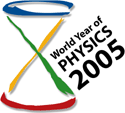





|
Congress of belarusian physicists World Conference on Physics and Sustainable Development UN Declares 2005 International Year of Physics Conditions for EW TF supports of the participations at international meetings The World Year of Physics |
 The World Year of Physics is on trackMartial DucloyEPS President For nearly two years, the European Physical Society has been engaged in making 2005 the "World Year of Physics" (WYP), getting support of international organisations for its realisation and success (Europhysics News 33, p.40). This initiative was endorsed by the council of the EPS and its member societies in 2001. It was recently voted unanimously by the General Assembly of IUPAP in October 2002 (Resolution 9). It is also backed by UNESCO. The next step is to get a resolution voted by the Assembly of the United Nations, declaring "The International Year of Physics' in 2005. The main purpose of the WYP is to raise world-wide public awareness of physics and, more generally, of physical sciences. The perception of physics and its importance in our daily life has decreased in the eyes of the general public to such a low level that the number of physics students in high schools and universities has dramatically declined over the past few years. In order to address this problem, it is important that Physics Societies all over the world become more active in sharing their visions and convictions about physics with politicians and the public in general. The great contributions of physics to the development of Science and Technology and its impact on our society might still be evident to us physicists, but no longer to everybody. At the dawn of the 21st century the interdisciplinary role of physics will further increase, and help solve crucial problems arising in our world such as: energy production, environmental protection and public health. The illustration of physics, physical sciences, and their achievements, must be a major axis of the WYP, and should be the object of numerous and multiform activities aimed at raising the interest of the general public: radio and television programmes, articles in newspapers and specialised magazines, books, action in schools and universities, general colloquia on physical sciences and the physical view of the world, local and itinerant exhibits, action "in the street", posters, stamps, advertising in mass transport systems, etc. (see the home page). Some of these activities could be included in general programmes already existing and aimed at public awareness of science: the European Science Week, "Cienca Viva" in Portugal, the science programme "La main a la pate" for pupils in French primary schools, "Physics on Stage".... Along with those outreach activities, scientific debates should also represent another important part of the actions to be planned in 2005. This includes debates on the great challenges of physics in the 21st century, the cultural character of physics and the need for education in physics in high schools and universities, the ethical responsibilities of physicists, the strengthening of physical sciences in developing countries and the influence of physics on development, the interdisciplinary character of physics and its impact on the emergence on new scientific and technological fields, the strong links of physics with technology and industry. Some more basic issues for physicists could include the relations between the various sub-fields of physics, the sense of unity of physics, the importance of maintaining pure physics research |at a high level, the relative place of "big" and "small" physics, the relations between basic and applied physics, between theoretical and experimental physics.... Some of the issues discussed above, along with the legacy of Einstein's groundbreaking discoveries on the 100th anniversary of his "Annus mirabilis", will be the object of the 13th General Conference of the European Physical Society, "Trends in Physics", which will be held in Bern, on the 11-15 July 2005. In view of the WYP success, what are the immediate tasks of Physics Societies? Establish a WYP national committee, send out WYP announcements and make sure that every scientist in their country is aware of the World Year of Physics; start planning events at the local and national level; contact national political authorities and governments in order to inform them, get their sponsorship and obtain the active support of their representatives in international organisations (UNESCO, UN...); start a regular newsletter in their bulletin or home page with a link with the WYP web site; transmit all information on activities and ideas to the EPS and Europhysics News, for its WYP section. The success of the World Year of Physics lies now in the hands of every physicist and relies on the determination of Physical Societies! Europhysics News, 34 (2003) 26. |